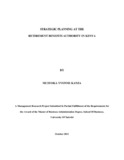| dc.description.abstract | Strategic planning is a component of strategic management. Strategic management can be
defined as the process by which managers select and implement a set of strategies that aim to
achieve sustainable competitive advantage for the organization.
Strategic planning refers to the process by which the leadership of an organization envisions its
future, establish objectives and choose the most suitable strategies for achieving these objectives
prior to taking action. The aim is to develop a strategic plan which forms the road map to lead an
organization from where its current position to where it would like to be in a five or ten-year
period.
The study was based on the Retirement Benefits Authority (RBA) in Kenya. The RBA is a
statutory body that was formed in 2000 following the enactment of the Retirement Benefits Act
in 1997. The Authority falls under the Ministry of Finance. The RBA is the regulator of the
retirement benefits industry in Kenya and is required to regulate and supervise the management
of retirement benefits schemes. In addition, it is expected to promote the development of the
industry and advise the Minister of Finance regarding policy formulation. The total assets under
management for the industry stood at K Shs.451 billion as at 31st December 2010.
The research had two objectives. Firstly, to determine the strategic planning adopted by the
Retirement Benefit Authority in Kenya. Secondly, to establish the challenges faced by
Retirement Benefit Authority in Kenya in carrying out its strategic planning activities. The study
findings are expected to be beneficial to various stakeholders including the RBA itself, the
Ministry of Finance, industry players and to academic scholars as well.
The research design was based on a case study. Data was collected using an interview guide. Indepth
interviews were carried out on five(5) senior managers at RBA who play a key role in
strategic planning and implementation. The respondents were highly experienced in corporate
management.
The study revealed that strategic planning process at RBA is formal and highly systematic. It is
currently carried out every five years with a review half way through the term. The planning is
based on the top-bottom-top approach allowing participation of the Board of Directors (BOD) as
well as all the employees. The BOD provides the strategic leadership and has the principal
responsibility for strategic planning.
The employees are involved in the exercise to review and critique the proposals made by the
BOD. They are also required to come up with strategies and an action plan which details how the
objectives will be achieved. There are also Technical Committees for the Staff and the BOD who
are involved in reviewing the draft strategic plan before approval by the main BOD. Strategic
planning at RBA has been successful however it has been coupled by a few challenges.
The study will provide insight on the on strategic planning adopted by various firms in Kenya.
The researcher concludes that there is no best approach to strategic planning and organizations
have developed different approaches to making strategy that they found suitable for their context | en_US |

